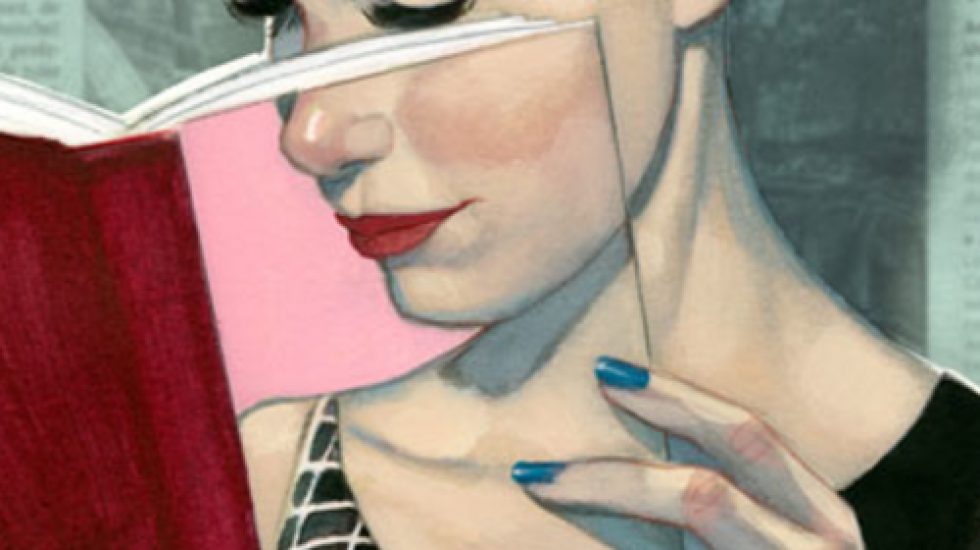
20 female writers we need to keep reading
I do not want to enter into feminist boundaries, but I will mention, as on previous occasions, that despite the difficulties, the repression, the denial, the contempt and the mockery of gender inequality, women have been writing for centuries.
Since you are in quarantine and we have time due to the home pressure that some people are suffering, I am going to share with you 20 authors from yesterday and today that no one should miss, regardless of whether you are a woman or a man, you should read them.
1.- Sappho of Lesbos
/s3.amazonaws.com/arc-wordpress-client-uploads/infobae-wp/wp-content/uploads/2018/03/07192422/safo.jpg)
There is not much biographical information about Sappho, who is supposed to have been called “the tenth muse” by Plato, but she is considered one of the most important voices of early Greek lyric poetry. She lived between the 6th and 7th centuries BC on the island of Lesbos, in a kind of “society” that prepared women for marriage. Based on her poems, it is said that Sappho fell in love with her disciples. Despite the centuries, the part of her work that has come down to us remains sensual, sweet, lively and vibrant.
2.- Jane Austen (1775-1817)
/s3.amazonaws.com/arc-wordpress-client-uploads/infobae-wp/wp-content/uploads/2017/07/17140701/Jane-Austen-Retrato-de-Jane-Auste-por-su-hermana-Cassandra-Austen.jpg)
Although her novels were read during her lifetime, the Englishwoman Jane Austen could hardly have imagined the success they would have two hundred years after her death. Crowds of fans rush to the cinema every time a new adaptation of her novel is released. Pride and Prejudice, Emma, or any of her other novels; so much so that Jane Austen's own fans have been honoured in the seventh art. The conventions about love have changed, but her irony, her sensitivity and her narrative mastery remain in force.
3.- Virginia Woolf (1882-1941)
/s3.amazonaws.com/arc-wordpress-client-uploads/infobae-wp/wp-content/uploads/2016/06/15182737/Virgina-Woolf.jpg)
Like Sappho and other authors on this list, Virginia Woolf is an icon not only of women's literature but also of the history of literature. queer (whose motives the author subtly explored in her famous novel Orlando). Although he wrote primarily fiction, the essay A room of one's own It became one of her most famous works: in it, Woolf questions the specific difficulties, both material and subjective, faced by a woman who wants to become a writer.
4.- Simone De Beauvoir (1908-1986)
/s3.amazonaws.com/arc-wordpress-client-uploads/infobae-wp/wp-content/uploads/2017/03/10132140/nota-feminismo-1920-Simone-de-Beauvoir.jpg)
Both De Beauvoir's fiction and philosophical texts were an investigation into the conditions of women's existence, what it means to be a woman in this world, and what it should mean (if it should mean anything). Texts such as Memoirs of a proper young lady, The broken woman either The second sex They are foundational pieces of feminist literature and thought, written with skill, intelligence and clarity, and their arguments are still fully relevant today.
5.- Marguerite Duras (1914-1996)
/s3.amazonaws.com/arc-wordpress-client-uploads/infobae-wp/wp-content/uploads/2017/04/13173055/Borrachines-Marguerite-Duras-1920.jpg)
The versatile Duras was acclaimed in her country and around the world for her work as a writer but also as a playwright, filmmaker and screenwriter. The script for Hiroshima my love (1959) earned her an Academy Award nomination in the category of Best Original Screenplay. Criticized at first for being “excessively romantic” (a characterization that many female writers have received in a derogatory tone), over the years critics and readers recognized Duras’ mastery in painting universes and emotions, and her unusual ability to create and recreate her characters in dialogue.
6.-Joan Didion
/s3.amazonaws.com/arc-wordpress-client-uploads/infobae-wp/wp-content/uploads/2017/11/05155238/didion.jpg)
At 83 years of age, Joan Didion has been going through a professional and personal renaissance for just over a decade. In the 1960s she was the most prominent woman of the so-called “new journalism” generation: her chronicles from those decades are emblematic of the questioning of the American dream. In Argentina, for example, she became more widely known after her last two books, which portray the loss of her husband, the writer John Gregory Dunne, and her daughter Quintana Roo. Her voice, which unmistakably combines coldness and vulnerability, has been imitated hundreds of times by various chroniclers, but never equalled.
7.- Sister Juana Ines of the Cross (1651-1695)
/s3.amazonaws.com/arc-wordpress-client-uploads/infobae-wp/wp-content/uploads/2018/03/07193438/Sor-Juana-Ines-de-la-Cruz.jpg)
The Mexican poet, writer and philosopher decided to take the vows to dedicate herself to studying everything she wanted, without being disturbed by any occupation. Despite this, true love is one of the themes that appears most often in her writing, as well as the question of destiny and the possibility of people to take control of it. In all her works, considered key pieces of the Golden Age and early Mexican literature, women play active and predominant roles.
8.-Lydia Davis
/s3.amazonaws.com/arc-wordpress-client-uploads/infobae-wp/wp-content/uploads/2017/07/18180322/Lydia-Davis-1920-1.jpg)
Prolific, funny and wildly original, Lydia Davis is famous for her work in what is called “flash fiction,” stories that end practically before they begin. Her quest could be thought of as the question of how to create literature with “the bare minimum”: short texts written in a stripped-down language that nevertheless shake, estrange and seduce.
9.-Emily Dickinson (1830-1886)
/s3.amazonaws.com/arc-wordpress-client-uploads/infobae-wp/wp-content/uploads/2017/12/11173839/Emily-Dickinson-1920-1.jpg)
Although she lived a rather quiet and secluded life, Emily Dickinson's poetry is notable for the subtlety and enthusiasm (even if sometimes it was a dark enthusiasm) with which her poems observe the world. Nature, friendship, love and contemplation are some of the themes that she weaves together with a language that is as delicate as it is powerful.
10.- Marosa Di Giorgio (1932-2004)
/s3.amazonaws.com/arc-wordpress-client-uploads/infobae-wp/wp-content/uploads/2018/01/14173423/marosa-di-giorgio-1.jpg)
This Uruguayan author is considered one of the most unique voices in 20th century literature in Latin America. Her experimental style and the wild eroticism of her texts, in which she creates her own language exploring nature, the myths surrounding it, bodies and change, scandalized and seduced her contemporaries in equal measure. Even today, her poems are read as original, unique and unmistakable.
11.- Gabriela Mistral (1889-1957)
/s3.amazonaws.com/arc-wordpress-client-uploads/infobae-wp/wp-content/uploads/2017/09/07180014/Gabriela-Mistral-SF-5.jpg)
Chilean poet Gabriela Mistral was the first Latin American author to receive the Nobel Prize for Literature in 1945 (and remains the only woman on the continent to have ever received one). She was also a teacher and diplomat, but what made her famous were her poems, overflowing with emotion and hope, which explored interiority but also focused on plebeian images of her native Chile.
12.- Maria Moreno
/s3.amazonaws.com/arc-wordpress-client-uploads/infobae-wp/wp-content/uploads/2016/12/16133105/maria-moreno-lectura-1920.jpg)
Iconoclastic, punk, acidic, subtle, always faithful and unfaithful to the spirit of her time, María Moreno is one of the great essayists of contemporary Argentina. In her chronicles, one can get to know the Buenos Aires of the margins from her particular voice, which neither denounces nor pities nor is scandalized. Her latest book, Black Out, led her to massive success with an autobiographical investigation about alcohol, the Once neighborhood, the construction of a female writer in a group of men, the persistence of the body, loss and other motifs.
13.- Sara Gallardo (1931-1988)
/s3.amazonaws.com/arc-wordpress-client-uploads/infobae-wp/wp-content/uploads/2017/03/03191632/Sara-Gallardo-1920.jpg)
Recently rediscovered, Sara Gallardo was quietly famous for her funny columns in the magazine Confirmed. Novels like The greyhounds and Blue pants They show an author with a sensitivity and freshness ahead of her time; her sense of humor, the power of her images and the subtlety with which she writes about love build an elegant and unmistakable style.
14.- Elena Ferrante
We do not know strictly whether Elena Ferrante's female pseudonym hides a woman or a man. However, the lucidity of her exploration of female friendship in the so-called "Neapolitan novels" (the saga that begins with The great friend) suggests that, if Ferrante is not a woman, she has at least studied them a great deal. In her novels, crudeness and intimacy become one and the same, a spirit that unfolds over an impoverished Italian village painted with honesty, hardness and sweetness.
15.- Hannah Arendt (1906-1975)
/s3.amazonaws.com/arc-wordpress-client-uploads/infobae-wp/wp-content/uploads/2018/03/07200051/Hannah-Arendt.jpg)
Hannah Arendt's political philosophy constitutes one of the most interesting theoretical contributions to understanding the 20th century and democracy. Since The origins of totalitarianism, Arendt set out to explain the totalitarian movements of her time from an ethical and metaphysical perspective, creating a vocabulary for thinking about political violence that is still extremely relevant today.
16.- Susan Sontag (1933-2004)
/s3.amazonaws.com/arc-wordpress-client-uploads/infobae-wp/wp-content/uploads/2018/03/07200331/susan-sontag.jpg)
Although she wrote fiction as well, it was her lucid essays on art, culture, life, and politics that earned Susan Sontag international fame. Perhaps her work on the concept of camp may be one of his most lasting contributions, but his entire philosophy is fundamental to understanding current culture and the way in which art and entertainment have been related since the second half of the 20th century.
17.- Valeria Luiselli
/s3.amazonaws.com/arc-wordpress-client-uploads/infobae-wp/wp-content/uploads/2017/11/22200636/Valeria-Luiselli.jpg)
Mexican Luiselli is one of the most prominent young writers in Latin America. Her novel The weightless, experimental without being pretentious, ambitious and personal, earned him recognition from the Spanish and English press; The lost children, a first-person account of her work with the so-called “border children” who emigrate alone to the United States from Latin America, recaptures the freshness and originality of her work of fiction and applies it with great sensitivity to a harsh and highly topical reality.
18.- Margarita Garcia Robayo
/s3.amazonaws.com/arc-wordpress-client-uploads/infobae-wp/wp-content/uploads/2018/03/07200957/Margarita-Garcia-Robayo.jpg)
Although she has lived in Buenos Aires for quite some time now, Colombian Margarita García Robayo retains traces of the Caribbean in her literature. Sensuality and rawness when talking about people, bodies and emotions are combined with surgical narrative precision, creating one of the most original voices in current Latin American literature. Her latest book, Time-out, explores the themes of love, marriage, family and identity.
19.- Almada Forest
/s3.amazonaws.com/arc-wordpress-client-uploads/infobae-wp/wp-content/uploads/2017/09/21105013/SelvaAlmada1_NAN2016_PH-VictoriaSchwindt.jpg)
In a country of vast countryside, Argentine literature and its obsession with cities sometimes seems like a conflict of national identity (and other times, simply the result of a system of hierarchies and exclusions that places rural writers on the margins). In this field, Selva Almada made her way, with novels like The wind that sweeps away and Bricklayers He established himself as one of the most recognized voices of Argentine literature throughout the world; critics and readers alike fell in love with his desolate landscapes, his taciturn characters and his always firm and strange voice. In 2014 he published Dead Girls, her first non-fiction book, about three femicides that occurred in Argentine provinces in the 1980s.
20.- Miranda July
/s3.amazonaws.com/arc-wordpress-client-uploads/infobae-wp/wp-content/uploads/2016/10/07211803/Miranda-July-SF.jpg)
A multifaceted artist (writer, screenwriter, director, actress, performer), Miranda July is both the heir to a long tradition of American writers and a completely new voice. With an avant-garde writing style freed from the conventions of good taste and good manners, she portrays the loneliness, anguish and contradictions of the 21st century with depth and humor. Her latest book, The first bad man, is a perfect example of these virtues.
After reading them, tell me what you think now.



